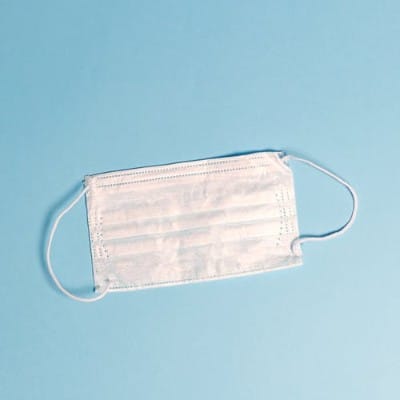 By Emily Lemiska
By Emily Lemiska
According to the Centers for Disease Control and Prevention, I could be at higher risk of contracting serious illness from COVID-19.
I live with rare neck and spinal cord defects, known as Klippel-Feil syndrome, which cause serious, debilitating pain. The condition affects my posture, which translates into reduced lung capacity. I also have the immune system of a flea: a cold that my husband recovers from in one week takes me about six weeks.
My increased risk is minor compared to others, but it’s still scary. But I’ve come to realize that, in many ways, living with chronic health issues for nearly a decade has prepared me for a worldwide pandemic.
1. Don’t threaten me with a good time—I’m used to the unknown.
Our society and culture trains us to think that we have control over our wellness, but that’s not necessarily true. Defective spines and infectious diseases don’t care about our best-laid plans.
I was the healthiest I’d ever been—exercising daily, eating well, and minimally stressed—when my neck worsened suddenly. One morning, I woke up with muscle spasms and nerve pain, pain that has yet to stop, nine years later. My life has changed completely.
I’m fortunate that I’ve been relatively stable since the onset of symptoms, but the future is uncertain: my condition is considered degenerative. Every time I experience a new ache or pang, I wonder if it’s here to stay. The lack of control can be excruciating.
That’s the reality with a pandemic, too. Even with all the hand sanitizer and social distancing in the world, you may simply just have the bad luck of being infected with COVID-19.
Recognizing that you can only do your best to avoid it, and focusing on the here and now, is essential to staying sane.
2. Working from home is my modus operandi.
Millions of Americans are now working from home or moving events and meetings online. Some might feel annoyed that they have to change up their routine; others like they’re getting an extended snow day.
For me? Working remotely is the only way I can earn a living.
I’m fortunate to have an employer (U.S. Pain Foundation!) that allows me a lot of flexibility, and have been working in my pajamas for years now. But that’s not the case for many people with disabilities, who are often met with resistance over accommodations and told their needs are unreasonable or untenable.
COVID-19 is showing us that yes, that meeting could have be an email, and that accommodations are not the problem—inflexible, ableist attitudes are.
We have so many wonderful technologies available to us, from Zoom to GotoWebinars to Slack. There’s no reason we can’t make work accessible for all, long after the pandemic ends.
3. Raincheck on the Olympics? No problem. I’m used to cancelling plans.
On the days when I’m in too much pain to function, I may have to cancel my plans. Sometimes I worry about seeming like a bit of a diva, and in general, I hate disappointing people.
But I know it’s necessary. For one, if I push myself and go, if I’m in a lot of pain, I won’t enjoy it as much anyway. Secondly, it could lead to a more serious pain flare-up, one that could make it so that I end up needing to cancel even more things.
Same goes for public gatherings and COVID-19. Yes, it’s hard to miss that concert or sporting event, but how much will you enjoy it if the person next to you starts coughing? How much will you lose out on if you end up seriously sick as a result? (And how bad will you feel if you pass it on to someone else?)
Hunker down now, and just think of how fun post-pandemic parties will be.
4. My home is already my sanctuary (since I’m often stuck there).
When I was healthy, I’d rarely come home before 9 pm on a weekday. Now, because my body requires a lot of rest, I spend a lot of time inside.
It was a difficult adjustment at first, but I’m resourceful (I was a Girl Scout for 10 years, after all). I read books, listen to podcasts, and watch TV. I cook a lot and have at-home yoga sessions. I do nearly all of our shopping online—groceries, clothing, household supplies—which is a great way to be productive while horizontal.
I’ve always got a running list of small chores to attend to, and I’ve never met a drawer that couldn’t be reorganized.
I’ve also made sure my house is my happy place. It’s only 1,000 square feet, but has no less than three couches, three recliners, and three beds, which I rotate around on like a modern-day Goldilocks. I’ve filled it with cozy pillows and blankets, plants, and artwork, and I keep it tidy as possible.
Two-week quarantine? Time to snuggle in and catch up on the latest season of Real Housewives.
5. If I had a nickel for every time a doctor didn’t have “the solution”
…I’d be riding out COVID-19 in a gold-plated bunker.
I think the average person might be startled by how little is known about COVID-19, and the uncertainty of how our health care system will fare in the event of a huge influx of patients.
But living with a rare condition—one that many doctors can’t even pronounce—I’ve known for years that the intricacies of the human body far outpace medical knowledge.
I’ve also known that health care doesn’t always have a treatment solution. I’ve tried every pain relief option in the books, but it turns out that preventing flare-ups (by pacing myself) and engaging in self-care (stretching, sleeping well, eating right) are often my best bets.
The same will likely go for COVID-19. I’m rooting for a vaccine or cure, but in the meantime, I’ll be hydrating and avoiding high fives.
A silver lining
The impact of the pandemic, thus far, is heart-breaking. Even as familiar as I am with some of the challenges, I’m devastated at the number of lives lost, and frightened for my safety and my loved ones.
When the dust settles, there is one silver lining I hope to see: a deeper appreciation for the chronically ill in our society, who live with these struggles, fears, and uncertainties—every day.
 Emily Lemiska is Director of Communications for U.S. Pain Foundation. She has a special interest in infectious disease, having worked closely with the Infection Control Unit in a Public Affairs role at a Boston hospital.
Emily Lemiska is Director of Communications for U.S. Pain Foundation. She has a special interest in infectious disease, having worked closely with the Infection Control Unit in a Public Affairs role at a Boston hospital.
